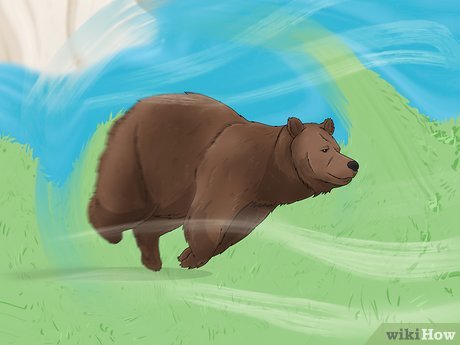Dreams often serve as a portal into our subconscious, reflecting our fears, aspirations, and the intricate tapestry of our lives. Among the plethora of dream motifs, encounters with animals—especially omnipotent figures like bears—serve as powerful metaphors. When one dreams of being attacked by a bear, the symbolism can be multifaceted, varying greatly from one culture to another. This analysis considers cultural relativism, posing the question: What does it signify within different societies when an individual dreams of being beset by such a formidable creature?
To embark on this exploration, we must first acknowledge that bears hold diverse meanings across cultures. In many indigenous traditions, bears are revered as sacred beings, often embodying strength, courage, and introspection. In contrast, in some Western contexts, bears are frequently associated with menace and aggression. This divergence in symbolism lays the groundwork for understanding the implications of a bear attack in a dream.
The anthropological concept of cultural relativism posits that a person’s beliefs and behaviors should be understood in their cultural context. As such, the dream of being attacked by a bear cannot be universally interpreted without considering the dreamer’s societal background, personal experiences, and regional folklore. This contextual lens becomes particularly significant when examining the psychological underpinnings of such dreams.
In North American Indigenous cultures, for instance, the bear is often considered a guardian spirit. Dreaming of a bear attack in this context might symbolize a confrontation with personal challenges, emotional turmoil, or an awakening to one’s inner strength. The bear, representing the psyche, might be urging the dreamer to face their fears, suggesting that the attack is not a literal threat but an invitation to introspection. Alternatively, the dream could reflect a disconnection from cultural roots, warranting a return to ancestral wisdom.
Conversely, in modern Western societies, we frequently associate bears with threats. The horror of an attack might symbolize feelings of vulnerability or aggression that the dreamer perceives in their waking life. It could indicate real-life conflicts, looming pressures, or an unstable emotional landscape. The bear, then, serves as a projection of an individual’s fight or flight response, often mirroring societal anxieties and fears surrounding powerlessness or loss of control.
Additionally, it is intriguing to consider how gender plays a role in dream interpretation. In many cultures, bears exemplify masculinity—strength, ferocity, and assertiveness. A man dreaming of a bear attack might grapple with notions of masculinity and societal expectations, questioning his own power dynamics. Conversely, women may interpret such dreams in relation to safety, vulnerability, and agency. Thus, the significance of the bear can alter depending on the dreamer’s gender, highlighting the need to consider intersectionality in dream analysis.
The geographical context further complicates the analysis. Regions where bears are native, such as Alaska or Canada, often feature these animals prominently in local lore. In those areas, a bear attack in a dream might relate directly to everyday fears of encountering these majestic beasts—not merely from a psychological standpoint but also as a reflection of tangible reality. In contrast, individuals from urban settings, untouched by the presence of bears, may find such dreams indicative of unrelated stresses or existential fears, removed from nature’s direct threats.
The nuance of emotions experienced during the dream also deserves attention. Emotions may range from fear and anxiety to empowerment and awe. The intensity of the dream could correlate with the dreamer’s life situation; heightened anxiety in the dream may reflect real tribulations, while a calm acceptance of the bear may suggest an embrace of one’s weaknesses, advocating for personal growth. These emotional reactions create a rich tapestry of interpretations, promising that the dream’s meaning is not stagnant but evolves with the dreamer’s experiences over time.
Moreover, one must consider the symbolic role of the bear in literature and myth. For example, in folklore, the bear often embodies transformation and healing. Some narratives speak of the bear as a teacher, leading individuals out of darkness—this could frame a bear attack in a dream as a catalyst for change, a necessary confrontation that compels the dreamer towards personal evolution. By embracing this perspective, the dreamer can recur to a cycle of self-discovery, where each encounter with the ominous figure is forged to illuminate an inner journey rather than a premonitory threat.
Finally, it is essential to engage with the broader implications of such dreaming phenomena within collective consciousness. Across cultures, dreams have been perceived as omens or messages from the divine. A bear attacking in a dream might provoke a response not only rooted in individual interpretation but also in communal narratives, highlighting shared fears and victories. This cultural synthesis underscores the interplay between personal anxieties and overarching societal sentiments, creating an overlap that shapes our understanding of both the individual and collective psyche.
In summary, to ascertain the implications of being attacked by a bear in a dream necessitates a kaleidoscopic perspective. The cultural, emotional, and contextual variables paint a diverse picture wherein the bear may oscillate between being a fierce adversary and a wise guide. Societal norms, folklore, personal experiences, and collective consciousness collectively converge, revealing that one’s confrontation with such a primal creature in the realm of dreams transcends mere symbolism. It urges the dreamer to wrestle with deeper truths concerning identity, agency, and the essence of human existence.
